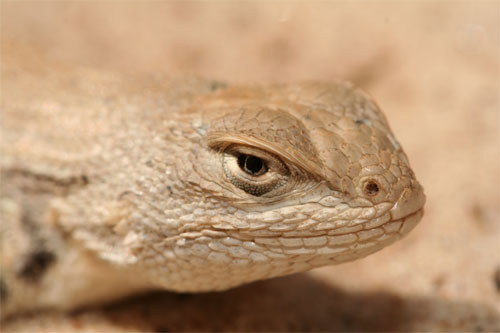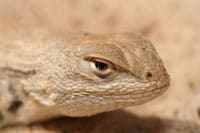Center of Biological Diversity to sue the U.S. Fish and Wildlife Service for not listing Sceloporus arenicolus as endangered.
The Center for Biological Diversity announced that it intends to sue the U.S. Fish and Wildlife Service over its decision to not protect the dunes sagebrush lizard (Sceloporus arenicolus) under the Endangered Species Act. According to The Center, the state government in Texas has refused to allow the USFWS to review agreements between the state and landowners to ensure that the dunes sagebrush lizard received adequate protections. In May 2012, U.S. Interior Secretary Ken Salazar said if enough oil companies and ranchers agreed to preserve the habitat of the small brown lizard, it would not need to be listed. Salazar said that approximately 95 percent of the lizard's shinnery oak habitat in New Mexico have been enrolled in conservation agreements, and 70 percent of the reptile's habitat in Texas has been enrolled since the plan was announced in February 2012. Without even reviewing the agreements, according to the Center, USFWS did not list the lizard as endangered because it said that protections initiated by the state were adequate.

USFWS
Dunes sagebrush lizard.
The Center proposed that the lizard be listed as an endangered species in 2002 and eight years later the USFWS proposed the lizard to be listed as an endangered species, only to reverse that proposal 18 months later, claiming conservation agreements with the state of Texas and landowners was enough not to list it. The Center also says that the agreements don't spell out what measures are being taken to protect the lizard, and that the state of Texas has not allowed federal wildlife officials or the public to review what conservation measures private landowners must adhere to. In 2011, Texas Comptroller Susan Combs sent a draft conservation agreement to the USFWS, that among other things, required landowners to limit seismic surveying by the oil and gas industry, limit the installation of oil lines to times of the year in which the lizard is not active, and the cleaning and managing of abandoned sites, among other proposed requirements. Because the state of Texas has not shared the final agreements with the USFWS, it is unclear what, if any agreements are being enforced.
The dunes sagebrush lizard is found in southeastern New Mexico and west Texas. Its habitat includes small areas of shinnery oak dunes in these states, according to the USFWS.



